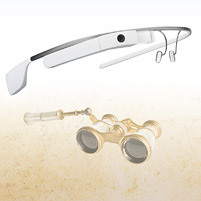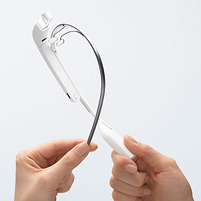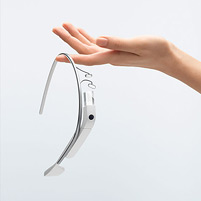An Eye for Opera



Google Glass
Opera glasses may look a little different in the future.
Carnegie Mellon University alumnus Thomas Rhodes (HNZ'11) is testing Google Glass for the opera industry.
By applying the technology to the art form, he hopes to provide audiences with a new perspective that is entertaining and educational.
The device, which resembles lens-free eyeglasses, emits a floating display. The user can ask the device to translate voice, send email, record video and take photographs.
Rhodes, the first student to complete the double-degree arts management program offered by CMU and the University of Bologna, was selected as part of Google's Explorer Program.
"Opera is a unique art form because it is in different languages, and there is a big trend right now for smaller, modern operas to be produced in alternative venues," said Rhodes, who works as a development associate at Forth Worth Opera.
"The supertitles, which are translations typically projected above the stage, aren't always visible depending on where you are seated. When you have these new venues and companies that travel from place to place, technology like this would be extremely useful for the audience," he said.
Rhodes envisions an app that can run the supertitles on the Google Glass.
"How wonderful would it be if we can devise a system like that. It could be a multilingual platform," he said. "The wearer could choose their language."
CMU's Quality of Life Technology (QoLT) Center and Human Computer Interaction Institute (HCII) also are working with Google Glass.
"Google Glass currently does not have an eye-tracker, so one of the things we are doing is looking at ways in which we can converge our First Person Vision technology with the Google Glass to benefit caregivers of dementia patients," said QoLT Director Daniel Siewiorek.
A First Person Vision monitor records and assists people in their daily lives at work or at play. It features two cameras — one that captures a person's full visual field and a second with eye-tracking software to pinpoint where a person is looking.
Select data can be reported back to the user for guidance, training, therapy or assistance purposes.
Jeffrey Bigham, associate professor in CMU's HCII, aims to give people with sensory disabilities easy access to information.
"The big advantage we see in Google Glass is that it is hands-free. A blind person could use it to get feedback as they cook a meal, or to learn things about the things around them while they are walking down the street," Bigham said. "For deaf people, we're able to stream real-time captions of the aural speech around them directly to the display, which may allow for less distraction from the activities they care about."
Rhodes noted other ideas for opera audiences might include providing director commentary or pop-up notes about the music to help educate audiences.
"You can see how transformational this technology would be," he said.
One important hurdle to overcome, though, would be addressing concern regarding the Google Glass' recording capabilities as they might relate to the performing arts.
"It's something that should be talked about in an open forum before decisions are made," he said. "I'm working on a platform through which I can get those conversations started."
The overlap of the arts and technology — a hallmark of CMU — is something that fascinates Rhodes.
"CMU was my top choice for its excellence in this area," Rhodes said. "I am drawn to positions that have some kind of possibility for art and technology to come together."
He added, "Fort Worth Opera has a reputation as an innovator in the industry. And my CMU credentials definitely had an influence in me being hired."
Related Links: Heinz College | About MAM-GIOCA | Google Glass | Fort Worth Opera | Fall 2013 issue of Opera America Magazine | USAToday: Applications for Google Glass
